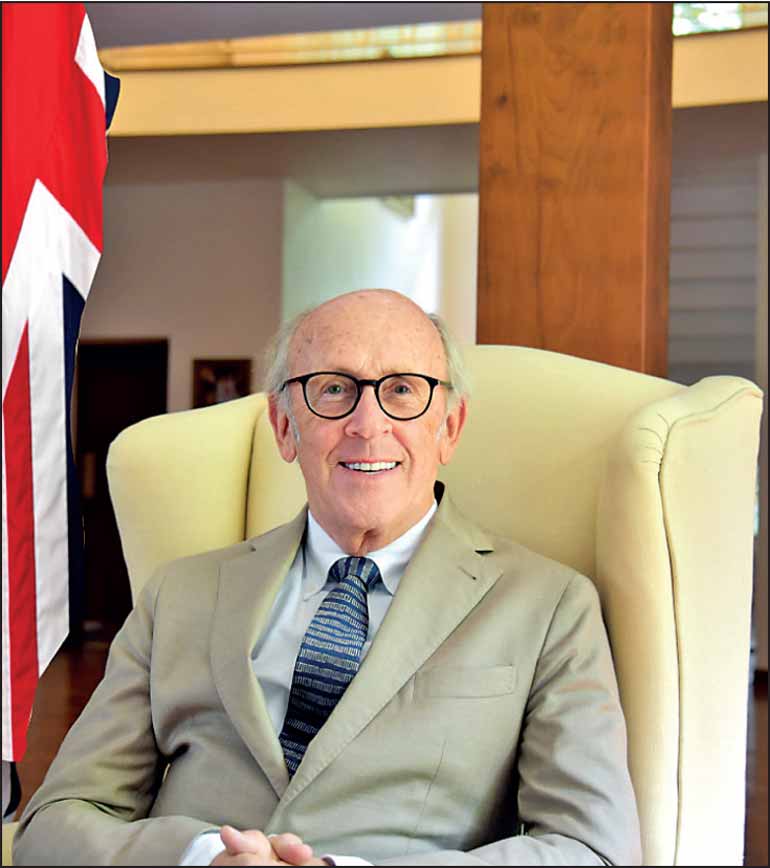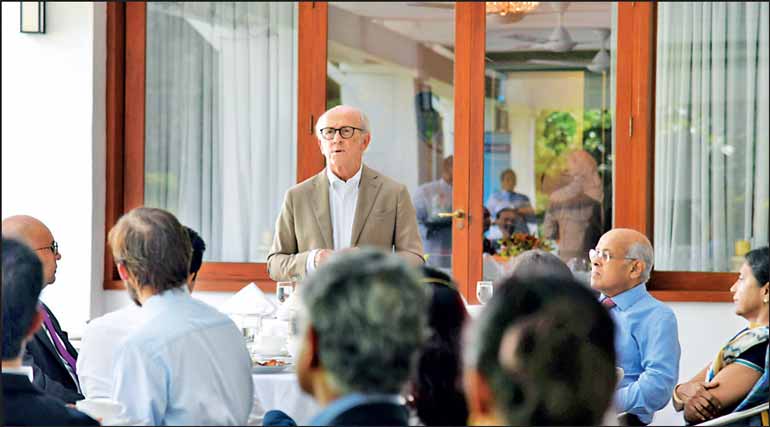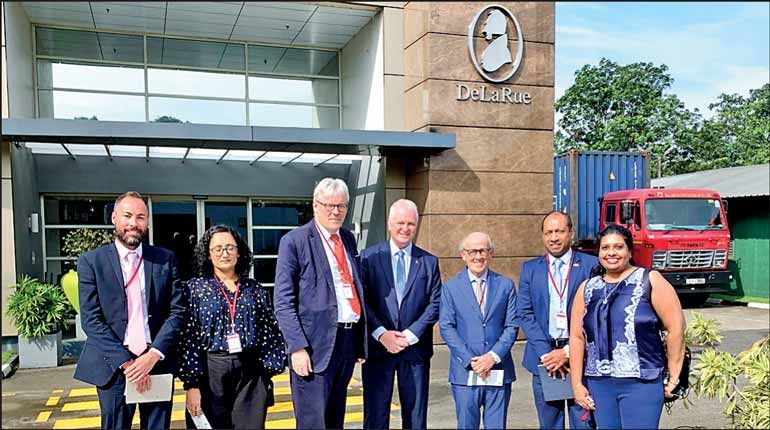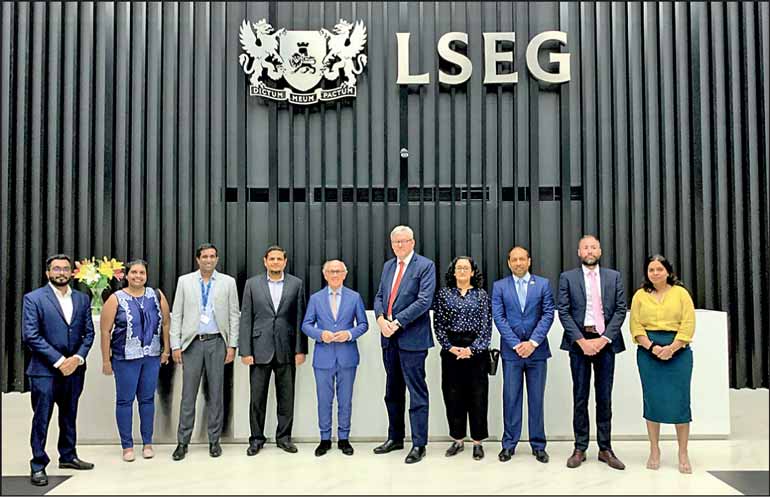Wednesday Feb 25, 2026
Wednesday Feb 25, 2026
Thursday, 16 November 2023 00:05 - - {{hitsCtrl.values.hits}}

Lord Davies

Meeting with business leaders

Visit to De La Rue

Visit to LSEG

Visit to Unilever
The UK Prime Minister’s Trade Envoy for Sri Lanka Lord Davies of Abersoch visited Colombo from 31 October to 2 November. During the visit, Lord Davis had meetings with Central Bank Governor Dr. Nandalal Weerasinghe, Minister of Power and Energy Kanchana Wijesekera, Minister of Trade Nalin Fernando, and Director General of State Enterprise Restructuring Unit Suresh Shah. Lord Davies discussed and exchanged ideas on Sri Lanka’s trading relationship, market access challenges faced by UK companies, and further opportunities for collaboration that supports the mutual economic prosperity of both the UK and Sri Lanka.
He visited the De La Rue and Unilever factories which are two successful examples of UK manufacturing excellence in the country. He also toured LSEG Technology that brings Sri Lankan tech talent to the forefront by delivering high performance solutions that service 40 financial markets globally. Lord Davies delivered a guest lecture to students following University of Plymouth courses at NSBM’s Green University, one of the 35+ UK university partnerships that are delivering world-class British transnational qualifications to students in Sri Lanka. He also addressed senior Sri Lankan business leaders on the importance of champions and particularly male allies to support greater gender equality in Sri Lankan workplaces and particularly in senior corporate leadership. In this interview with the Daily FT, Lord Davis recaps his visit as well as shares key insights to the current status and future potential for UK-Sri Lanka relations.
Q: Following your visit, what do you see as the key trade and investment opportunities, and where is the UK supporting Sri Lanka?
There are several opportunities that are evident, of which I see education, manufacturing, tech development, and renewable energy as some of the key areas where the UK has expertise and excellence to support Sri Lanka’s potential and ambitions.
I had the pleasure of visiting a number of UK businesses operating in Sri Lanka. De La Rue is an impressive example of a public-private-partnership in operation, one that is exporting to 30+ markets out of Sri Lanka, showcasing the country’s potential from the perspective of manufacturing and exports. Unilever is another manufacturing facility that is local retail focused, providing well known global brands that are daily requirements for Sri Lankan lives. In addition, LSEG’s offices demonstrate the innovative capability of Sri Lanka’s talented IT sector. Apart from being sectors of further potential, the underlying factor is the tremendous impact these UK companies are delivering both directly and indirectly to the local economy through the large number of jobs that they are providing. This is also a credit to the excellent skills and capabilities they have access to in the market.
On that front, I met students studying University of Plymouth courses at the local NSBM campus. This is just one example of the next generation of businesspeople and entrepreneurs that are being nurtured through the significant UK transnational education offering in Sri Lanka. The UK is the leading provider of private higher education and professional studies in the country, making world-class qualifications affordable and accessible to students right here in Sri Lanka. With over 35 UK universities offering courses through local partners, Sri Lanka is the third largest source market for the UK in terms of transnational education. This places the UK as a crucial partner in developing the talented workforce that is a key strength for the country.
On energy generation, UK funding supported the Offshore Wind Roadmap for Sri Lanka published recently by the World Bank. We are keen to engage further as this is an area where the UK has world-leading capabilities. For on-shore options, I had the opportunity to visit the office of Ryse Energy, a UK renewable energy company who are developing partnerships and opportunities both in the market and wider region.
Q: The UK’s new trading scheme DCTS launched earlier this year. How will Sri Lanka benefit from this scheme?
The UK’s Developing Countries Trading Scheme (DCTS), gives 65 developing countries access to the UK’s simpler and more generous preferential trading scheme by cutting tariffs, removing conditions and simplifying trading rules. Sri Lanka can now trade with the UK tariff-free on 92% of goods. This includes over 150 additional product lines than what was offered under the previous scheme.
With the UK being Sri Lanka’s second largest export market, the DCTS offers greater opportunities for trade. But Sri Lanka too needs to diversify its export offerings to improve the utilisation of the available preferences. The current utilisation remains low at around 60%.
To support business take-up of the DCTS, the UK Trade Partnerships (UKTP) now covers DCTS countries, including Sri Lanka. £ 200,000 of ODA funding has been allocated to Sri Lanka to be part of the UKTP program this year. This funding for Sri Lanka aims to support up to 10 Sri Lankan export-ready SMEs and the program is delivered by ITC (International Trade Centre) who is working with the Sri Lankan Export Development Board (EDB). The call for applications has closed, and ITC and EDB are following through on the company selection, while the support activity for the selected companies will be delivered across January and February 2024.
Q: The COVID pandemic followed by an economic crisis has hit businesses in Sri Lanka hard. What changes have you seen since your last visit, and what are your observations on how they can bounce back?
The private sector has a very crucial role to play. Despite the significant challenges the country faced particularly during the last year, following my engagements with the business community I am left with a strong sense of optimism.
Stable policies and a transparent and level playing field for all is vital. For example, the lifting of almost all of the import restrictions enabling free trade is no doubt a relief for business and consumers alike. There are further challenges that businesses face that could be resolved quite easily with proper digitisation of processes and services. These will be valuable efficiencies that matter to both existing businesses and in attracting new investors.
For businesses looking for access to financing options, the UK remains one of the world’s most open and connected financial centres. The UK is also the leader for green finance products and services in the world’s financial centres. With banks such as HSBC and Standard Chartered operating in Sri Lanka for decades, we are keen to continue exploring opportunities for UK financial and professional services in the market that could support businesses in the country.
An opportunity for Sri Lankan businesses to expand their global reach is considering setting up subsidiaries in the UK. Ranked as the No. 1 in EY’s Attractiveness Survey (June 2023), the UK has many more such credentials to speak of. The UK provides a thriving ecosystem particularly for younger and innovative companies who are looking to turn their ideas into commercial success. For example, the growth of unicorns that the UK has produced is a testament to the UK’s vibrant tech ecosystem – the UK is ranked third globally for unicorns, behind only the USA and China. To enable this type of global expansion also requires freer movement of forex, which at present remains a challenge for Sri Lankan businesses.
Q: You are a strong advocate for equality and ensuring women have a seat on boards. Why is this issue important to you? Can you tell us about some of the work you’ve done on this?
The last time I was in Colombo I was struck by the low numbers in terms of female representation on Sri Lankan boards, and in senior management in general. I am a firm believer that the key forces that can drive change are the male leaders in the industry. Their role as allies is crucial in supporting access for women to have more seats on boards. During this visit I had the opportunity to speak to several senior Sri Lankan business leaders on this issue, and I hope I have left them with some food for thought.
After having led many teams in the UK, I was transferred to Asia where I realised that a significant number of the high performing teams were led by women. I was intrigued to understand how well these powerful and talented teams functioned. I have since taken what has sometimes felt an extremely lonely stand as a change agent to lead the charge on pushing for diversity of gender and opinion among senior corporate leaders.
In 2011 I launched an independent review into Women on Boards, which is also known as the Davies Report. I am proud that the Women on Boards report has been a catalyst for action in the UK. Recommendations included that FTSE 100 companies should be aiming for a minimum of 25% female board member representation with FTSE 350 companies setting their own higher targets. As I said then, it isn’t simply about aiming to meet any specific figure and neither is it just about promoting equal opportunities. It is also about improving business performance because there is strong evidence to demonstrate that diverse boards are better at delivering financial performance and growth. This is because diversity brings together a broad range of experiences and provides new ideas and fresh perspectives. A significant change in culture needs to take place, and I hope to continue this conversation in future engagements and visits.